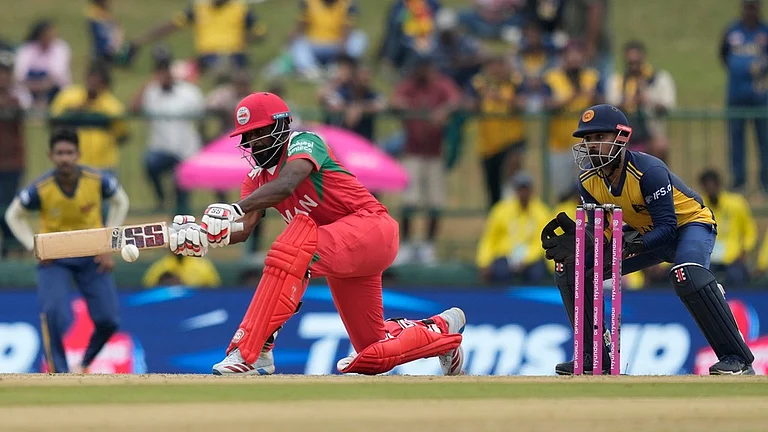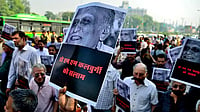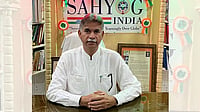During the 2021 Covid lockdown, Bablu Bhat, 36, was running on empty. As he struggled with clinical depression, he lost all hope owing to the health issues of his son and himself. Stuck between a rock and a hard place, Bablu allegedly threw himself into the Ranbir canal and ended his life in the afternoon of August 27.
Bablu used to run a small cellphone recharge shop at the old migrant camp in Purkhoo, on the periphery of Jammu city. The camp was set up by the government about 30 years ago when militancy-affected Kashmiri Pandits started coming to Jammu in droves.
While the rented shop had to be wound up following Bablu’s death, his family, comprising his wife Sangita, 29, and their two sons, Avikshit and Shoumik, continue to live in a one-room prefab portacabin. A part of their house has been divided with curtains to separate the kitchen space. The joints between the roof and the walls have been fixed with packaging tape. And the broken window panes have been covered with clothes and paper.
The Bhats are one of 115 impoverished displaced Pandit families—registered with the Relief and Rehabilitation Commission (Migrants) Jammu—who feel abandoned by the government and society. These families had left the Valley in the wake of security threats when militancy peaked in Kashmir in 1990.

They made the run-down migrant camp their home soon after it was abandoned by earlier migrants who shifted to flats built by the Manmohan Singh-led UPA government, about 12 years ago. According to an official list dated March 19, 2020, as many as 529 militancy affected migrant families, the majority of them Kashmiri Pandits, continue to wait for government flats.
In Jammu, the majority of the displaced Kashmiri Pandits now live in cramped, two-room flats comprising a room, a small lobby, a kitchen and a washroom, at migrant townships built by the UPA government at Jagati, Nagrota, Purkhoo, Muthi and Butta Nagar.
At the old Purkhoo migrant camp, the inmates decry official apathy, citing a lack of basic amenities and government services. While they also lament the lack of proper bathing spaces, the concerned authorities seem to have forgotten to extend the benefits of the much-touted Pradhan Mantri Sauchalay Yojana (Free Toilet Scheme).
For want of safe drinking water, they rue, they are always at risk from waterborne diseases.
The current occupants of the 30-year-old prefab structures at the old camp say they were finding it difficult to continue living in rented accommodations due to unemployment, diseases and inadequate financial assistance from the government.
Flanked by her two sons, Sangita tells Outlook, “My husband was under a lot of mental stress. He underwent surgery for kidney stones in 2019. Later, he got infected with the coronavirus. Post-covid, our situation went from bad to worse.”
“Before he drowned himself, he called his cousin and told her over the phone that life had become unbearable for him,” she says. Showing the entries in her husband’s diary, she alleges, “Those who were supposed to return his money had stopped responding to his calls.”
Sangita is worried about her eldest son, Avikshit, who is also suffering from the renal disorder. He is to be operated upon again next month. “Due to financial problems, I am finding it difficult to manage things,” she says, requesting the new Relief and Rehabilitation Commissioner (Migrant) Jammu to allot a flat to her family.
“For want of cleanliness in this locality, I am afraid, my son may get infected after the surgery,” she said, explaining how the family suffers in the camp during extreme weather conditions.
“Our family gets monthly assistance of Rs 9,000 and 30 kg of rice from the Relief Commission. Apart from this, I don’t have any other support system,” she adds.
Her neighbour, Sushma Raina, 44, is also sailing in the same boat. “We came to this camp over six years ago. After my husband suffered a massive heart attack, it had become difficult to afford medicines, educate our children and pay monthly house rent,” says Sushma, fighting back tears. “It is very difficult to live in these tin structures. The only solace is that we don’t have to worry about monthly rent.”

“We too have applied for a government flat, but don’t know when we will get one allotted,” she says, before describing the hardships of camp life. “We face frequent disruptions in water and power supply. The restoration usually takes several weeks, and that too, after we stage protests at the nearby Jammu-Poonch highway.”
At times, camp inhabitants complain, the tin roofs of their houses get blown away by high-velocity winds. Snakes and other threats always lurk in the summer and rainy season, when houses inside the camp get surrounded by thick grass and green bushes, they say.
Pooja Kaul, 45, and her husband, Rakesh, 51, run a small shop. The couple has a daughter. Their only son passed away in 2018 when he was 10 years old.
“We feel worse off than orphans. It seems as if we don’t exist for the government. We have started feeling so traumatised that we can’t even think clearly about giving a secure future to our daughter,” says Pooja. “Our son was struggling for life in the hospital when the government officials made us run from pillar to post for the allotment of a flat. Without any government help, we ensured his medical treatment on borrowed money. But neither did we get the flat, nor could we save our son.”


























